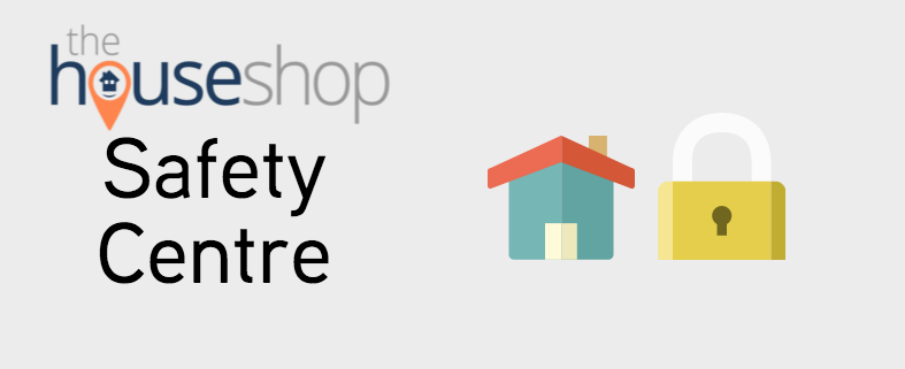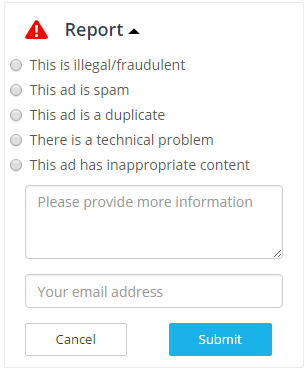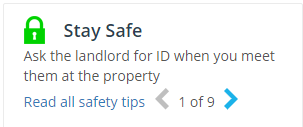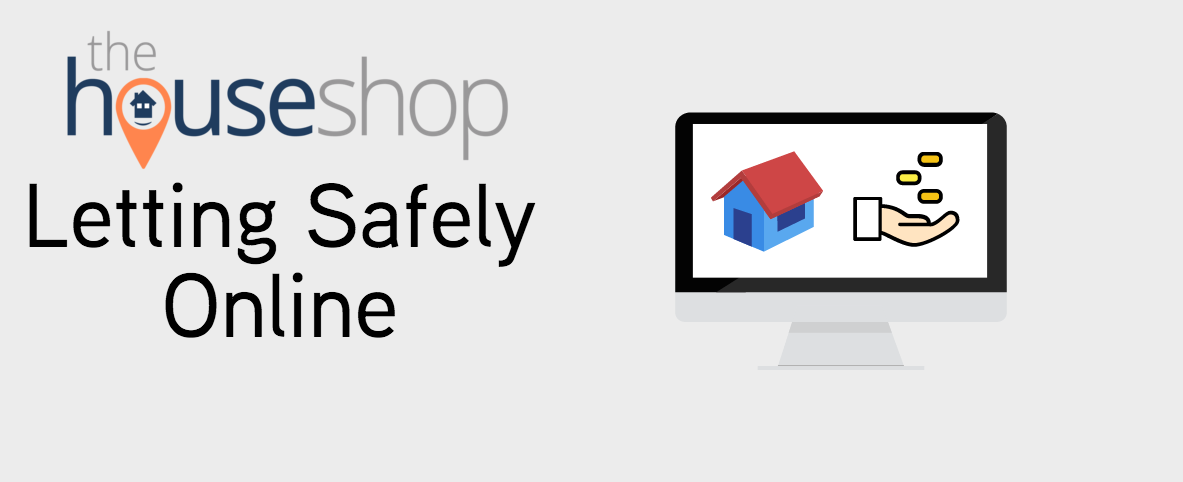
It is important to remember that the majority of users on TheHouseShop website are genuine and 99% of the time enquiries are legitimate, but nonetheless it is wise to arm yourself with safety information and the tools to keep yourself safe online.
TheHouseShop Safety Centre contains tips and guidance on how to spot potential scams, how to stay safe online and what to do if you think an advert could be fraudulent. If you have any further questions that have not been answered in the Safety Centre, or if you would like to speak to a member of TheHouseShop security team, please send an email to security(at)thehouseshop.com including your contact details and a member of our team will contact you as soon as possible.
Below you will find several different sections with advice for different types of users. Whether you are a tenant, buyer, seller or landlord, we have created a safety tips section to help you stay safe online.
Here at TheHouseShop.com, we care deeply about the safety of our users and we have put in a lot of time, effort and research to create the safest and most secure place to find and advertise property online.
We are aware that some classified advertising websites have a negative image when it comes to safety and security - but TheHouseShop is here to change that. Because we deal exclusively in property, we can take advantage of official records and databases that may not exist for other types of product or services, allowing us to verify the authenticity of every listing on our site.
We use the Land Registry owner verification. The Land Registry hold the most comprehensive database of property ownership records in the UK.
When a landlord or seller creates a property advert on our website, they must pass a number of security and verification checks, including:
The final Land Registry verification check requires the advertiser to provide details of the property being advertised and details of the registered owner, and we then run a check against the Land Registry database to instantly verify legal ownership of the property. This verification process is the first of its kind in Europe and will be a crucial safety procedure to prevent rental scams and fraudulent listings on TheHouseShop.com.
Tenants and buyers using TheHouseShop.com can feel confident that the properties they are viewing are genuine - giving them the extra piece of mind they need when securing a property. We have a variety of security and safety measures in place to ensure that all of our users feel confident and comfortable when using our site.
For anyone using our website, there is one very simple rule to ensure you don't fall victim to a scam or online fraud:
All our landlords agree that they will never request an up-front payment from a tenant before allowing them to view the property first - and any landlord who breaks this rule will be immediately banned from the site.
No genuine landlord would expect you to transfer thousands of pounds in deposits and rent to secure their property without visiting the property in person and taking the time to properly assess your potential new home. If a landlord pressures you to pay money upfront, or gives excuses for why they will not be able to arrange a viewing for you, this should be seen as a huge red flag and you should proceed with caution.
If you have been asked to transfer an up-front fee by an advertiser on our website, please report them to us immediately by sending an email to security(at)thehouseshop.com with as much information as possible including a link to the property listing, the advertiser's name, copies of any correspondence you have had with the user, and anything else you think we may find useful to investigate the account.
We do everything we can to help maintain TheHouseShop as a safe and secure platform to find and advertise the property, but we also rely on our users to help us fight online fraud. We really value and appreciate your help and if you ever have a concern about safety and security while using our site, please don't hesitate to get in touch with us.

Online rental fraud typically happens when would-be tenants are tricked into paying an upfront fee to view or secure a property to rent.
These types of scams are becoming increasingly common in the online property market, and tenants should be aware of the potential dangers and how to spot fraudulent or suspicious ads.
Scammers put a lot of time and effort into making their adverts appear as legitimate as possible, but there are still some simple things you can look out for which should act as alarm bells.
If the property is being marketed at a price that seems too good to be true, then it is highly likely that the listing is fraudulent. Do some research and make yourself aware of the market value for the type of property you are looking for in the areas you are looking for. If you see a property at far below the market level, you should be extremely cautious.
Property listings with just 1 or 2 images and poorly written descriptions should also be treated with caution. A genuine landlord will want to show off their home in the best possible light and give potential tenants as much information about the property as possible. If a listing contains only a generic image of the front of the property and no interior images, this should be treated as highly suspicious.
Look out for spelling mistakes or sentences that don’t make sense in the description on the listing, this should be another red flag in determining if an ad is legitimate.
If an advertiser states in the description on the ad that you should contact them directly via email or if they ask you to follow a link to an external website that you have not heard of, you should be extremely wary of pursuing the property.
Scammers will post ads on legitimate property websites, but then do their best to move communication with the tenant away from the legitimate site to avoid having their activity flagged by security departments. Always communicate with the advertiser through the websites own messaging system until you feel confident that the advertiser is legitimate.
A favourite method of rental scammers is to claim that they are renting the property on behalf of the owner who is unavailable for whatever reason. They will usually claim that the owner is living overseas and has asked them to rent out the property for them in their absence.
Be cautious of advertisers who claim to be doing this in their description or in their correspondence with you.
Scammers are constantly coming up with new ways to try and exploit their targets, but there are some common types of scams that appear over and over again. Below we have highlighted some of these common scams to help you spot and avoid them.
A scammer will rent a property and then show multiple tenants around the property and ask for the first month’s rent, security deposit and any other fees up front. They will repeat this procedure will multiple tenants over the course of a week or 2 and will then disappear with the money, never to be seen again.
In this case, a scammer will hijack a legitimate rental listing by changing the email address or contact information associated with the advert, and placing a modified ad on multiple other websites. In some cases the modified ad may even use the name of the person who posted the original genuine ad, which can make it difficult to determine which ads are fraudulent.
Scammers may also attempt to hack the account of a genuine property owner who is advertising their property for sale or to rent. The scammer will then respond to genuine enquiries without the homeowner’s knowledge and encourage prospective tenants to send an upfront payment.
In this case the scammer will claim that they are renting the property for a friend or relative who is sick or currently living overseas. In reality, they will have gained access to the property illegally by breaking in while the genuine owners are away.
Scammers will create fraudulent online listings for properties that they do not own or properties which do not exist. They will then contact potential tenants and claim that they need to receive an up-front payment to gain access to the keys to view the property, as they themselves do not live in the same country as the property in question.
Communication from these types of scam artists will usually be easy to spot as they will use broken English and have spelling and grammar mistakes in the text.
Below we have listed some of the recent rental scams that have been uncovered by our fraud prevention checks. These scams are most likely being used across various classified advertising sites and other property listing websites, so it’s a good idea to familiarise yourself with them and learn how to spot/avoid them in future.
In this particular scam, the fake “landlord” informs the tenant that they will need to go through Rightmove’s “Tenant Verification” process to pay a deposit for the property and gain the ability to sign a tenancy agreement.
The landlord then sends the tenant a “Verification Request” via email which uses Rightmove branding to trick the tenant into thinking it has been sent by a well-known and reputable company.
The email will instruct the tenant to transfer an up-front fee (usually 1 month’s rent + 1-month deposit) via bank wire transfer and will provide bank account details for the transfer.
The instructions claim that the money will be held in a secure account and that you can request the money back should you decide not to rent out the property. However, in reality, one the tenant has made a payment, the fake “landlord” will cease all communication and will deactivate any email addresses or phone numbers to ensure the tenant cannot make contact with them.
If you receive any request asking you to go through a Rightmove tenant verification process, you should immediately cease all communication with the landlord and report their details to TheHouseShop or any other site where you originally made contact with the landlord.
If you receive an email claiming to be from a well-known company, make sure that you check the email address that the message came from. The company’s name should be used as the domain in the email address e.g. info@rightmove.co.uk NOT rightmove@gmail.co.uk
In this particular scam, the fake “landlord” will inform the tenant that they are letting the property through Airbnb and the scammer will then send a fake Airbnb “Reservation Invoice” requesting an up-front payment to secure the property.
The scammer sends the reservation invoice via a fake email that is designed to look exactly like a genuine AirBnB branded message. The user will then be encouraged to click through to a temporary website which requests the user’s payment information to make the deposit.
The scammer will explain that they are using Airbnb because they have had trouble with bad tenants in the past and therefore want to secure payment before they show the tenant around the property and agree to the tenancy. They will also usually provide a link to the money-back guarantee section on the real Airbnb website to instil trust in the system.
Once the tenant has made payment via the fake website, the “landlord” will disappear, take down the temporary website and delete any email addresses or contact information to avoid further communication with the tenant.
Here at TheHouseShop we take the safety and security of our users incredibly seriously. All advertisers who create a property listing on our website have their advert manually reviewed by a real person who is trained to spot any suspicious activity.
Anyone who creates a free advert on our website must provide a contact phone number and free adverts are not published until a member of our team has spoken to the advertiser via phone to confirm their identity and the details of the listing.
On all of our property listings you will find a ‘Report This Ad’ section (see below for example) where you can flag any suspicious adverts to our security team who will manually review the listing and take the appropriate action.

The 'Report This Ad' section appears on the right hand side of the screen under the orange 'Request Information' button on all property listing pages. Any adverts which are flagged for review using the ‘Report This Ad’ function are immediately sent to our security department where a member of staff will review the advert manually and take the appropriate action.
We have a variety of other security measures in place to maximise the safety of the users on our website and any suspicious activity is reported to the appropriate authorities.

On all our property listings you will find a 'Stay Safe' section with a selection of tips and advice for buying, renting, selling and letting property online safely.
We are doing everything we can to help maintain the safety and security of the users on our website, but scammers are using increasingly sophisticated methods to target consumers, and users should always take caution in all their online interactions.

Buyers searching for property online should always be cautious and make sure that they are aware of the simple steps they can take to stay safe online. Scammers often target online property websites and unsuspecting buyers can fall victim to targeted campaigns if they do not take care during their property search.
TheHouseShop helps thousands of buyers to find the home of their dreams each day, and we want to make sure that all of our users stay safe and secure throughout the process. Below we have provided advice on how to spot potentially fraudulent listings, tips for staying safe online and information on how to report an advert and what to do if you believe you are the victim of a scam.
If you require any further information or have a question that has not been answered in the safety centre, then please send an email to security(at)thehouseshop.com with your contact details and a member of TheHouseShop team will be in touch as soon as possible to discuss your needs.
Buying a home is likely to be the largest purchase you will ever make, and it is worth taking a little extra time and effort to make sure that you protect yourself and your interests at every stage in the process.
While scammers are constantly coming up with new ways to deceive consumers, there are some typical signs that you can look out for which usually indicate that a listing may be fraudulent or misleading. Below we have summarised some key points that you should look out for when searching for a property to buy online.
If the property is being marketed at a price that seems too good to be true, then it is highly likely that the listing is fraudulent. Do some research and make yourself aware of the market value for the type of property you are looking for in the areas you are looking for. If you see a property at far below the market level, you should be extremely cautious.
Property listings with just 1 or 2 images should be treated with caution. A genuine seller will want to show off their home in the best possible light and will usually provide a range of high-quality images showing each room in the house (or at least the main living spaces). If a listing contains only a generic image of the front of the property and no interior images, this should be treated as highly suspicious, as the advertiser may have simply found an image of property on Google and used it to mislead potential buyers.
A genuine seller will use the description on their property advert to give potential buyers a detailed and accurate idea of what they can expect from the property. Listings with very short descriptions should be treated with caution.
Buyers should also look out for spelling and grammar mistakes in property descriptions, as this can be an indication that the seller is not legitimate.
You should always request more information about a property using the website’s authorised contact method. If an advertiser encourages buyers to contact them directly and provides an email address or external link in the description, you should ignore this and make contact using the website’s own system regardless.
Scammers will post ads on legitimate property websites, but then do their best to move communication with the buyer away from the legitimate site to avoid having their activity flagged by security departments. So always be wary of a seller who seems determined to communicate with you privately.
A favourite method of scan artists is to pretend that they are selling a property on behalf of a friend or relative who is sick or out of the country. Be cautious when dealing with sellers who claim to be doing this in their description or in their communication with you.
Here at TheHouseShop, we take the safety and security of our users incredibly seriously. All advertisers who create a property listing on our website have their advert manually reviewed by a real person who is trained to spot any suspicious activity.
Anyone who creates a free advert on our website must provide a contact phone number and free adverts are not published until a member of our team has spoken to the advertiser via phone to confirm their identity and the details of the listing.
On all of our property listings, you will find a ‘Report This Ad’ section (see below for example) where you can flag any suspicious adverts to our security team who will manually review the listing and take the appropriate action.

The 'Report This Ad' section appears on the right-hand side of the screen under the orange 'Request Information' button on all property listing pages. Any adverts which are flagged for review using the ‘Report This Ad’ function are immediately sent to our security department where a member of staff will review the advert manually and take the appropriate action.
We have a variety of other security measures in place to maximise the safety of the users on our website and any suspicious activity is reported to the appropriate authorities.

On all our property listings you will find a 'Stay Safe' section with a selection of tips and advice for buying, renting, selling and letting property online safely.
We are doing everything we can to help maintain the safety and security of the users on our website, but scammers are using increasingly sophisticated methods to target consumers, and users should always take caution in all their online interactions.

The internet has revolutionised the property industry and the number of people selling property online has increased dramatically over the past 5 years. Property portals have become a key marketing instrument for anyone and everyone selling a property and sellers should make sure they are aware of how to stay safe when marketing a property online themselves.
Selling property online with TheHouseShop is both safe and simple, but there are a few easy steps you can take to make sure that you stay safe online.
If you are selling your property yourself using TheHouseShop.com, you will need to manage enquiries from potential buyers and liaise with them about the property using TheHouseShop’s secure messaging system.
You should always ask for full details of any potential buyer, including their full name, full address, contact phone number and email address. It is also sensible to ask any potential buyers about their buying position – are they waiting to sell their own property? Are they a cash buyer? Do they have a mortgage agreed in principle?
These types of questions can help you understand a bit more about your potential buyer and should give you an idea of how serious they are.
If you receive an enquiry that seems strange, you should proceed with caution. If, for example, a potential buyer offers to pay you an amount significantly higher than your asking price in their first contact with you, this should be treated as highly suspicious. If it seems too good to be true, it usually is.
Unlike using a high street estate agent, if you are selling your home privately or with an online estate agent, you will need to carry out the viewings yourself. You know your home better than anyone else and buyers will be pleased to have the opportunity to ask questions directly to the homeowner as they look around the property.
It is important that you keep yourself and your property safe when you are conducting viewings. You are essentially inviting strangers into your home, and there are a few simple steps you can take to ensure that everything goes smoothly.
If you notice any unusual activity on your account or believe that it may have been hacked, you should immediately contact the owners of the website with your full name, your account details, and a brief explanation of why you believe your account has been hacked.
If you find a property advert for a property which you believe the advertiser does not own (for example if you find your own property is being advertised for sale without your permission) you should immediately report this to the website owners.
You can do this either by sending an email to safety(at)thehouseshop.com with a link to the advert in question and a brief explanation of the situation, or you can use the ‘Report This Ad’ function located on the right hand side of the property advert page.
If you receive an enquiry for your property that worries you in any way, you should forward the message and your details to security(at)thehouseshop.com and cease communication with the potential buyer until your complaint has been reviewed and resolved by TheHouseShop Safety & Security team.
Here at TheHouseShop we take the safety and security of our users incredibly seriously. All advertisers who create a property listing on our website have their advert manually reviewed by a real person who is trained to spot any suspicious activity.
Anyone who creates a free advert on our website must provide a contact phone number and free adverts are not published until a member of our team has spoken to the advertiser via phone to confirm their identity and the details of the listing.
On all of our property listings you will find a ‘Report This Ad’ section (see below for example) where you can flag any suspicious adverts to our security team who will manually review the listing and take the appropriate action.

The 'Report This Ad' section appears on the right hand side of the screen under the orange 'Request Information' button on all property listing pages. Any adverts which are flagged for review using the ‘Report This Ad’ function are immediately sent to our security department where a member of staff will review the advert manually and take the appropriate action.
We have a variety of other security measures in place to maximise the safety of the users on our website and any suspicious activity is reported to the appropriate authorities.

On all our property listings you will find a 'Stay Safe' section with a selection of tips and advice for buying, renting, selling and letting property online safely.
We are doing everything we can to help maintain the safety and security of the users on our website, but scammers are using increasingly sophisticated methods to target consumers, and users should always take caution in all their online interactions.

The number of private landlords in the UK has increased dramatically over the past few years and more and more homeowners decide to rent out their properties themselves. Letting your rental property online with TheHouseShop is both safe and simple, but there are a few easy steps you can take to make sure that you stay safe online.
Below we have outlined some of the common scams in the online rental market, how to handle tenant enquiries and conduct viewings safely, our top tips for letting property safely online and a brief FAQ section with advice on what to do if you believe you have experienced a security issue.
If you have any further questions that have not been answered in the Safety Centre, or to speak to a member of our Safety & Security department, please send an email to security(at)thehouseshop.com with your contact information and a member of TheHouseShop team will be in touch as soon as possible to discuss your needs.
If you are a private landlord you will need to advertise your rental property to find potential tenants. All private landlords can advertise their properties for free on TheHouseShop.com and you will need to create your own property listing by setting your rental price, writing a description, uploading images and any supplementary documents (e.g. EPCs or Gas Safety Certificates) and adding any additional information about your admin fees or specific features.
When you are creating your property advert it is not advisable to include your personal contact details in the description of your property.
Robots and scam artists crawl the internet looking for phone numbers and email addresses that they can target, so by including your personal contact details you are opening yourself up to spam or nuisance calls and emails.
When writing your description, make sure that you do not include too much information about the security set up of the property, as this information could be used to gain access to the home illegally.
If you are renting out your property yourself, you will need to handle enquiries from potential tenants and communicate with them about the property using TheHouseShop’s secure messaging system.
You should always ask for full details of any potential tenant, including their full name, full address, contact phone number and email address. It is also sensible to ask any potential tenants about their renting position – are they currently involved in another tenancy contract? How quickly are they prepared to move in?
If you have any specific requirements for renting your property, for example if you will not allow smokers or pets, you should also raise these requirements with any potential tenants to avoid wasting both the tenants’ and your time.
These types of questions can help you understand a bit more about your potential tenants and should give you an idea of how suitable they will be for your property.
If you receive an enquiry that seems strange in any way, you should proceed with caution. If, for example, a potential tenant offers you an amount significantly higher than the listed rental price, this should be treated as highly suspicious. If it seems too good to be true, it usually is.
Unlike using a Letting Agent, a private landlord will need to carry out viewings themselves. It is important that you keep yourself and your property safe when you are conducting viewings and you should keep in mind that you are essentially inviting strangers into your home.
Here are a few simple steps to avoid any issues and ensure that everything goes smoothly
While it is not a legal requirement to have a written tenancy agreement for all types of tenancies, it is not strongly advised that you use one regardless.
The tenancy contract is the single most important document when letting a property and will protect the interests of both the tenant and the landlord.
If you are an experienced landlord who is familiar with the letting process and the finer points of property law, then you may feel confident drafting your own tenancy agreement. However there are a number of free online resources where you can review standard tenancy agreements and edit them to suit your needs.
If you are a new landlord and are uncertain of how to properly structure a tenancy agreement, you may want to consider hiring a lawyer or legal adviser to help you draft your contract.
Tenant referencing is an essential part of the letting process and will give you an idea of how reliable and suitable a tenant is for your property.
Some private landlords choose to conduct their own tenant referencing by asking potential tenants for a list of previous employers and landlords who can be contacted to provide references. This is a perfectly acceptable and legal method of referencing tenants, however it is not as comprehensive as the tenant referencing services offered by professional bodies.
TheHouseShop offers a comprehensive tenant referencing service for all private landlords which includes a full credit check on any potential tenant.
If you notice any unusual activity on your account or believe that it may have been hacked, you should immediately contact the owners of the website with your full name, account details, and a brief explanation of why you believe your account has been compromised.
The website owners can then review your case and take the appropriate action. You should not continue to use the account until you have been contacted by the website owners to confirm that they have resolved the issue and are happy that your account is secure.
If you find an advert for a property which you believe the advertiser does not own (for example if you discover that a property you own is being advertised to rent without your permission), you should immediately contact the website owners.
You can do this either by sending an email to security(at)thehouseshop.com with a link to the advert in question and a brief explanation of the situation, or you can use the ‘Report This Ad’ function located on the right hand side of the property advert page.
If you receive an enquiry for your property that worries you in any way, you should forward the message and your details to security(at)thehouseshop.com and cease all communication with the potential tenant until your complaint has been reviewed and resolved by TheHouseShop Safety & Security team.
Here at TheHouseShop we take the safety and security of our users incredibly seriously. All advertisers who create a property listing on our website have their advert manually reviewed by a real person who is trained to spot any suspicious activity.
Anyone who creates a free advert on our website must provide a contact phone number and free adverts are not published until a member of our team has spoken to the advertiser via phone to confirm their identity and the details of the listing.
On all of our property listings you will find a ‘Report This Ad’ section (see below for example) where you can flag any suspicious adverts to our security team who will manually review the listing and take the appropriate action.

The 'Report This Ad' section appears on the right hand side of the screen under the orange 'Request Information' button on all property listing pages. Any adverts which are flagged for review using the ‘Report This Ad’ function are immediately sent to our security department where a member of staff will review the advert manually and take the appropriate action.

On all our property listings you will find a 'Stay Safe' section with a selection of tips and advice for buying, renting, selling and letting property online safely.
We have a variety of other security measures in place to maximise the safety of the users on our website and any suspicious activity is reported to the appropriate authorities.
We are doing everything we can to help maintain the safety and security of the users on our website, but scammers are using increasingly sophisticated methods to target consumers, and users should always take caution in all their online interactions.